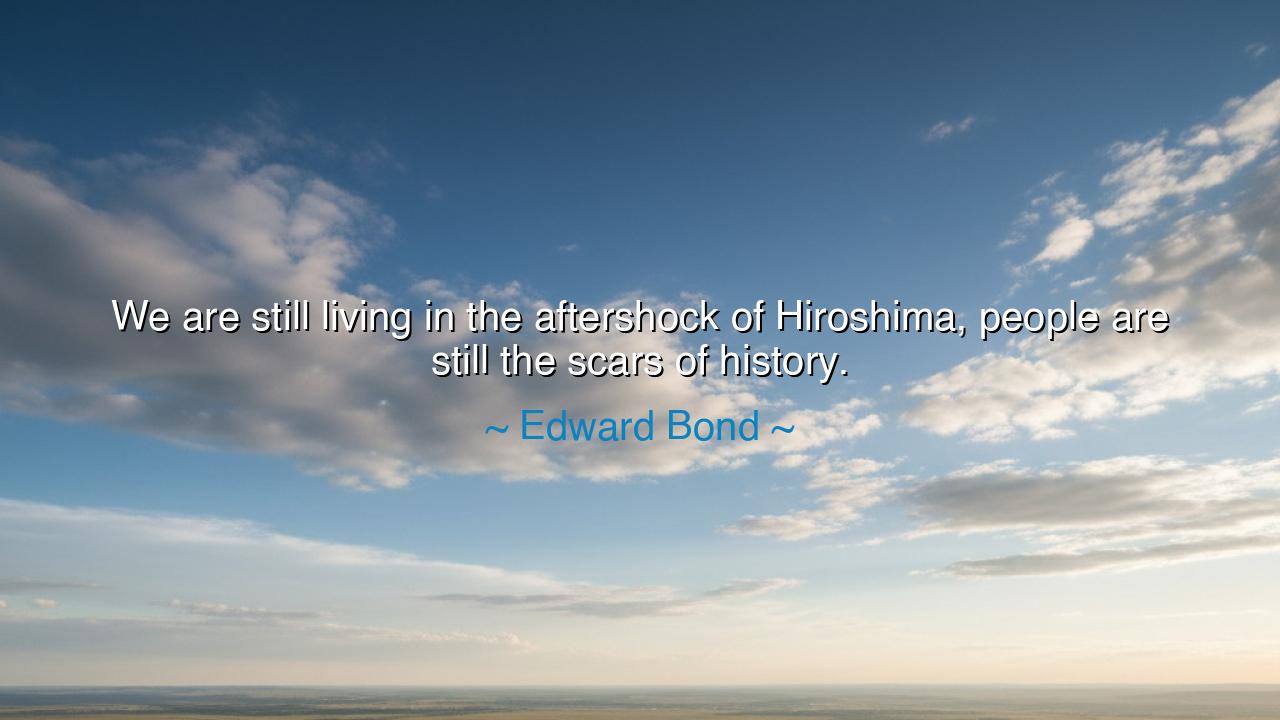
We are still living in the aftershock of Hiroshima, people are
We are still living in the aftershock of Hiroshima, people are still the scars of history.






Hearken, O children of memory and seekers of wisdom, and attend the words of Edward Bond, who spoke with the solemnity of one who beholds the enduring echoes of human catastrophe: “We are still living in the aftershock of Hiroshima, people are still the scars of history.” In these words lies a meditation upon the persistence of trauma, the moral weight of human action, and the truth that the reverberations of history are etched not only in records, but in the very lives and bodies of men and women.
Bond teaches that the events of the past do not end when the flames are extinguished or the treaties signed; they linger in the hearts, minds, and flesh of those who survive. Hiroshima was not merely an explosion of fire and metal; it was a rupture in the moral and human fabric of the world. Those who lived through it, and the generations that followed, carry its mark—an enduring reminder that history leaves its scars upon the living.
Consider the survivors of Hiroshima, the hibakusha, whose lives were forever altered by the atomic blast. Their stories speak of devastation, illness, and loss, but also of resilience, testimony, and the unyielding will to live. The physical scars on their bodies were mirrored by psychological and societal wounds, illustrating Bond’s truth: the consequences of history are not confined to textbooks—they persist in the flesh and in memory. Humanity bears the burden of its own creations, for good or ill.
The moral force of Bond’s words extends beyond Hiroshima itself. History is replete with examples where human action, whether by war, conquest, or oppression, leaves enduring consequences upon survivors and their descendants. The Holocaust, the transatlantic slave trade, and other tragedies serve as reminders that the aftershocks of human cruelty ripple through generations, shaping communities, cultures, and identities long after the events themselves have ended.
Bond’s reflection is also a warning and a call to conscience. To ignore the scars of history is to risk repeating the same calamities. Survivors’ testimonies, historical records, and collective memory are not mere relics; they are moral guides. By acknowledging the human cost of our decisions, by seeing the pain etched in flesh and spirit, we cultivate empathy, prudence, and the courage to act in ways that prevent further suffering.
Consider the story of Sadako Sasaki, a young girl who survived the initial blast of Hiroshima but later succumbed to leukemia caused by radiation. Her wish for peace and her thousand paper cranes became a symbol for remembrance and reconciliation. This example embodies Bond’s insight: the aftermath of history lives in people, and from these scars arise lessons, advocacy, and the imperative to seek justice and prevent repetition. Memory becomes moral action.
From this reflection emerges practical guidance: study history not merely to recount events, but to honor the lived experiences of those who endured them. Listen to survivors, understand their struggles, and let their stories guide action. Advocate for peace, empathy, and justice, and recognize that decisions made today will echo in the lives of future generations. The aftershocks of history demand vigilance and moral courage.
Thus, remember: humanity carries its past in the flesh, in the mind, and in the spirit. Edward Bond’s words teach that the consequences of history are not abstract; they are alive in people, in their scars, in their memories, and in their stories. To honor history is to honor those who bear its weight, and to act with conscience, foresight, and compassion. The aftershocks endure, and through awareness and moral action, we may soften their impact upon the generations yet to come.
If you wish, I can also craft a more dramatic, audio-ready version, vividly illustrating Hiroshima, the stories of the hibakusha, and Sadako Sasaki, making Bond’s message emotionally and spiritually resonant for listeners. Do you want me to do that next?






AAdministratorAdministrator
Welcome, honored guests. Please leave a comment, we will respond soon